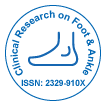Nosso grupo organiza mais de 3.000 Séries de conferências Eventos todos os anos nos EUA, Europa e outros países. Ásia com o apoio de mais 1.000 Sociedades e publica mais de 700 Acesso aberto Periódicos que contém mais de 50.000 personalidades eminentes, cientistas de renome como membros do conselho editorial.
Periódicos de acesso aberto ganhando mais leitores e citações
700 periódicos e 15 milhões de leitores Cada periódico está obtendo mais de 25.000 leitores
Indexado em
- Google Scholar
- Sherpa Romeu
- Abra o portão J
- Chaves Acadêmicas
- RefSeek
- Universidade Hamdard
- EBSCO AZ
- OCLC – WorldCat
- Publons
- Fundação de Genebra para Educação e Pesquisa Médica
- Euro Pub
- ICMJE
Links Úteis
Diários de acesso aberto
Compartilhe esta página
Abstrato
The Effects of off-the-Shelf Foot Orthoses on the Quality of Life of Patients Diagnosed with Early Rheumatoid Arthritis
Derek Santos
Background: Rheumatoid Arthritis (RA) is a chronic and progressive disease that is reported to affect the foot in about 90% of cases. Off-the-shelf foot orthoses are widely used to treat patients with early RA because they are cost-effective but more evidence on their clinical effectiveness is required. This study aims to strengthen the current evidence for off-the-shelf foot orthoses.
Methods: Thirty-five patients participated in the study (mean age (SD) was 52.4 (13.3) years). None of the participants had received foot orthoses or had contra-indications to their use. Participants were excluded if they suffered from concomitant musculoskeletal disease, endocrine disorders, and neurological disease. For the within subject controlled study design, data was collected at baseline, three months and six months. A biomechanical assessment was carried out at baseline and the chair-side customized off-the-shelf foot orthoses supplied. Every patient completed the Leeds Foot Impact Scale (LFIS) questionnaire at each visit.
Results: For LFISif subscale there was statistical significance between baseline and three months (p=0.000) and baseline and six months (p=0.000). Similar results were also found for LFISap between baseline and three months (p=0.001) and baseline and six months (p=0.000).
Conclusion: This study suggests that cost-effective off-the-shelf foot orthoses are effective in the management of early RA patients. Patients may expect to see an improvement in QOL by three months with a further improvement by 6 months. This positive effect on QOL is also clinically significant provided patients wear their orthoses for at least six months.
Diários por Assunto
- Agro e Aquicultura
- Alimentação e Nutrição
- Bioquímica
- Ciência da Computação
- Ciência de materiais
- Ciencias ambientais
- Ciências Clínicas
- Ciências Farmacêuticas
- Ciências gerais
- Ciências Médicas
- Ciências Sociais e Políticas
- Ciências veterinarias
- Economia e Contabilidade
- Enfermagem e cuidados de saúde
- Engenharia
- Engenheiro químico
- Física
- Genética e Biologia Molecular
- Geologia e Ciências da Terra
- Gestão de negócios
- Imunologia e Microbiologia
- Informática
- Matemática
- Química
Revistas clínicas e médicas
- Anestesiologia
- Assistência médica
- Biologia molecular
- Cardiologia
- Cirurgia
- Dermatologia
- Diabetes e Endocrinologia
- Doenças infecciosas
- Enfermagem
- Fisioterapia e Reabilitação
- Gastroenterologia
- Genética
- Hematologia
- Imunologia
- Medicamento
- Medicina Reprodutiva
- Microbiologia
- Nefrologia
- Neurologia
- Odontologia
- Oftalmologia
- Oncologia
- Ortopedia
- Pediatria
- Pesquisa Clinica
- Pneumologia
- Psiquiatria
- Toxicologia

 English
English  Spanish
Spanish  Chinese
Chinese  Russian
Russian  German
German  French
French  Japanese
Japanese  Hindi
Hindi